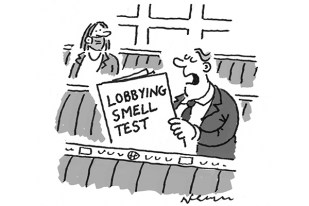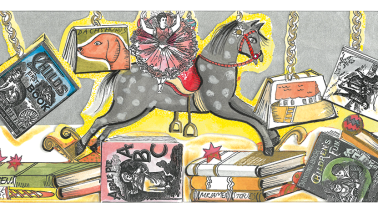‘What follows plague?’ I asked a medieval historian at the start of the pandemic. ‘War,’ he replied. In recent days, this remark has seemed worryingly prescient: 120,000 Russian troops are massing on the border with Ukraine, China is aggressively increasing military activity across the Taiwan Strait and Iran has responded to Israel’s successful sabotage of its nuclear facility by declaring it will enrich uranium to close to the level required for a nuclear bomb.
The West — and specifically the new US President — is being tested. Those who want an end to the western-led rules-based system are pushing to see what they can get away with. British foreign policy sources dismiss the idea that Russia and China are coordinating their actions, but there is little doubt that the two countries benefit from the fact that there are two simultaneous challenges in Europe and Asia. The West’s plans for a US-led ‘tilt’ to the Indo-Pacific will be tricky while Russia continues to menace Europe; something that Joe Biden’s administration has acknowledged with its reversal of Donald Trump’s decision to pull around 12,000 troops out of Germany. Moscow and Beijing know that they can act when the West is distracted by the actions of the other. If China did ever try to seize Taiwan, Russia would almost certainly take the opportunity to march into Eastern Ukraine.
‘Anybody who threatens the fundamental interests of our security will regret it like they have not regretted anything,’ warned Vladimir Putin in his annual speech to the Federal Assembly on Wednesday. He said Russia would respond to any crossing of its ‘red lines’, which ‘we ourselves will define in each separate case’. It was an attempt to tell the West to back off at a time when his control at home is being challenged by pro-opposition protests.

Putin has taken the opportunity provided by the pandemic to advance his interests with vaccine diplomacy. Last month, in a video call with Emmanuel Macron and Angela Merkel, he discussed possible European use of the subtly named Sputnik vaccine. Jens Spahn, the German health minister, has made clear that if it is approved by the European Medicines Agency he will order doses for Germany even if the European Commission declines to do so.
The Russian vaccine may, however, not be what it seems. The Slovakian health authorities declared earlier this month that the Sputnik doses it had been sent did not appear to be the same drug that the EMA was examining or that had been described in the Lancet. The Russian people also seem suspicious of the vaccine. The mayor of Moscow, Sergey Sobyanin, has suggested that over-sixties should be offered a discount on food and services to encourage them to take it as so few people are coming forward. There have been fewer discussions in Europe about buying the vaccine since the reports from Slovakia.
Those who want an end to the western-led rules-based system are pushing to see what they can get away with
That all doses of the Russian vaccine are not what they are meant to be is hardly surprising. Just look at the treatment of Alexei Navalny, the Putin opponent whom Moscow tried and failed to assassinate and who is now in prison on trumped-up charges. Russia’s actions abroad are also becoming more blatant. The Czech Republic expelled Russian diplomats this week after a Russian intelligence cell, which included the pair accused of the Salisbury poisoning in 2018, was found to have been responsible for explosions there in 2014. Last week, the US and the UK blamed Russia for the SolarWinds hack, which hit US government agencies and corporations.
So how to deter Russian aggression? The costs imposed on Moscow so far have not been enough to change Putin’s approach. It is depressing that Prague’s attempt to create a coordinated expulsion of Russian diplomats has had such meagre results and the EU has not taken joint action.
The Russia sanctions announced by the Biden administration last week were intended to show that the US is prepared to stop Moscow from borrowing money on the international markets. This would place a significant financial squeeze on the Putin regime. The view in Whitehall is that there is now an appetite in Europe to respond to any Russian mini-invasion of Ukraine with serious economic sanctions.
Boris Johnson, who is not given to public self-reflection, has admitted that his initial belief as foreign secretary that he could reset relations with Russia was a mistake. Since the Salisbury poisonings, the UK’s policy towards Russia has been to try to expose Moscow’s activities. There is, though, an argument that the approach needs to be more personal than this: that the most effective way to deter Putin is to make it clear to him that the details of his immense personal wealth will be revealed in the event of any Russian encroachment. Strikingly, a poll suggests that more than a quarter of Russians have seen a Navalny video revealing Putin’s opulent palace on the Black Sea. Putin says it is not his — and his former judo partner claims to be the owner.
Despite everything we know about the Russian regime, and much to the dismay of the Biden administration, the German government is still going ahead with Nord Stream 2, a pipeline that would bring Russian gas directly into Germany, bypassing Ukraine and Poland. Armin Laschet, the CDU’s candidate for Chancellor, has already said he doesn’t see the Navalny case as a reason for cancelling it. Ironically, the best chance for the project being shelved would be if the Greens took the chancellery — which is far from impossible given the current polls. Few would have believed back in the 1980s, when the German Greens were defined by their opposition to Ronald Reagan’s nuclear build-up, that a Green victory could one day remove a major bone of contention in US-German relations.
The situation in Ukraine is threatening to turn into the first European security crisis since Britain formally left the EU. The UK’s involvement suggests that its commitment to the security of the continent has not been diminished by its departure from the bloc. But it is also revealing that the UK position on Russia is so closely aligned with that of the Biden administration. Brexit has reinforced the centrality of the US relationship to British foreign policy.







Comments